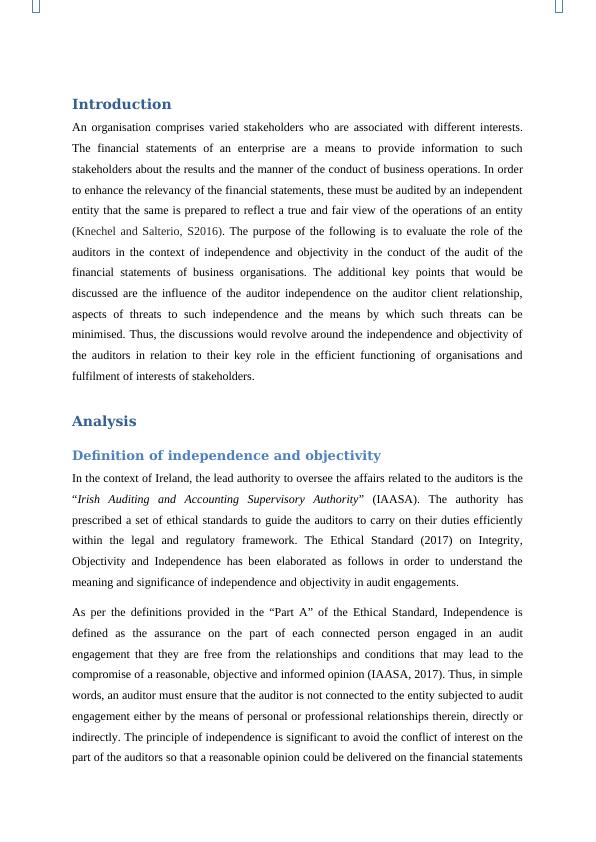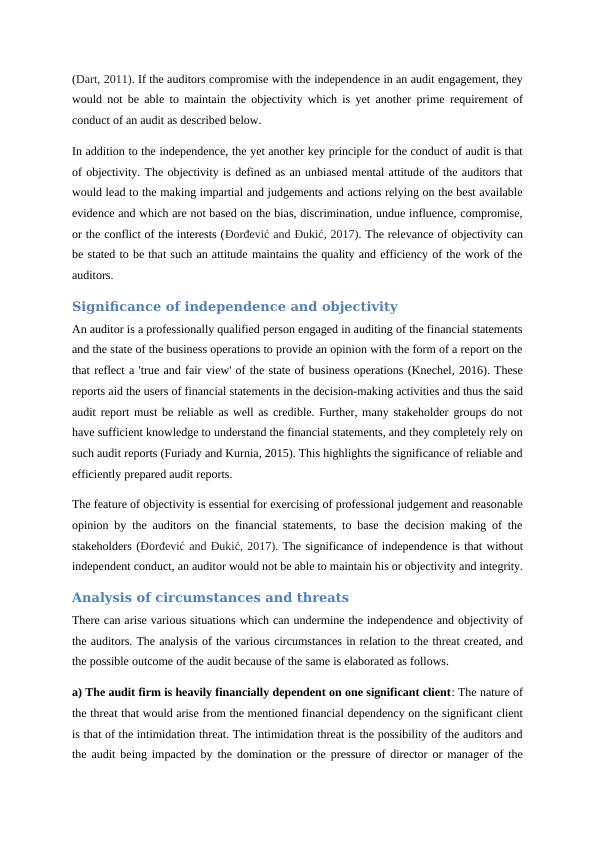Auditing and Assurance: Independence and Objectivity
Added on 2022-08-22
8 Pages2431 Words19 Views
AUDITING AND
ASSURANCE
ASSURANCE

Introduction
An organisation comprises varied stakeholders who are associated with different interests.
The financial statements of an enterprise are a means to provide information to such
stakeholders about the results and the manner of the conduct of business operations. In order
to enhance the relevancy of the financial statements, these must be audited by an independent
entity that the same is prepared to reflect a true and fair view of the operations of an entity
(Knechel and Salterio, S2016). The purpose of the following is to evaluate the role of the
auditors in the context of independence and objectivity in the conduct of the audit of the
financial statements of business organisations. The additional key points that would be
discussed are the influence of the auditor independence on the auditor client relationship,
aspects of threats to such independence and the means by which such threats can be
minimised. Thus, the discussions would revolve around the independence and objectivity of
the auditors in relation to their key role in the efficient functioning of organisations and
fulfilment of interests of stakeholders.
Analysis
Definition of independence and objectivity
In the context of Ireland, the lead authority to oversee the affairs related to the auditors is the
“Irish Auditing and Accounting Supervisory Authority” (IAASA). The authority has
prescribed a set of ethical standards to guide the auditors to carry on their duties efficiently
within the legal and regulatory framework. The Ethical Standard (2017) on Integrity,
Objectivity and Independence has been elaborated as follows in order to understand the
meaning and significance of independence and objectivity in audit engagements.
As per the definitions provided in the “Part A” of the Ethical Standard, Independence is
defined as the assurance on the part of each connected person engaged in an audit
engagement that they are free from the relationships and conditions that may lead to the
compromise of a reasonable, objective and informed opinion (IAASA, 2017). Thus, in simple
words, an auditor must ensure that the auditor is not connected to the entity subjected to audit
engagement either by the means of personal or professional relationships therein, directly or
indirectly. The principle of independence is significant to avoid the conflict of interest on the
part of the auditors so that a reasonable opinion could be delivered on the financial statements
An organisation comprises varied stakeholders who are associated with different interests.
The financial statements of an enterprise are a means to provide information to such
stakeholders about the results and the manner of the conduct of business operations. In order
to enhance the relevancy of the financial statements, these must be audited by an independent
entity that the same is prepared to reflect a true and fair view of the operations of an entity
(Knechel and Salterio, S2016). The purpose of the following is to evaluate the role of the
auditors in the context of independence and objectivity in the conduct of the audit of the
financial statements of business organisations. The additional key points that would be
discussed are the influence of the auditor independence on the auditor client relationship,
aspects of threats to such independence and the means by which such threats can be
minimised. Thus, the discussions would revolve around the independence and objectivity of
the auditors in relation to their key role in the efficient functioning of organisations and
fulfilment of interests of stakeholders.
Analysis
Definition of independence and objectivity
In the context of Ireland, the lead authority to oversee the affairs related to the auditors is the
“Irish Auditing and Accounting Supervisory Authority” (IAASA). The authority has
prescribed a set of ethical standards to guide the auditors to carry on their duties efficiently
within the legal and regulatory framework. The Ethical Standard (2017) on Integrity,
Objectivity and Independence has been elaborated as follows in order to understand the
meaning and significance of independence and objectivity in audit engagements.
As per the definitions provided in the “Part A” of the Ethical Standard, Independence is
defined as the assurance on the part of each connected person engaged in an audit
engagement that they are free from the relationships and conditions that may lead to the
compromise of a reasonable, objective and informed opinion (IAASA, 2017). Thus, in simple
words, an auditor must ensure that the auditor is not connected to the entity subjected to audit
engagement either by the means of personal or professional relationships therein, directly or
indirectly. The principle of independence is significant to avoid the conflict of interest on the
part of the auditors so that a reasonable opinion could be delivered on the financial statements

(Dart, 2011). If the auditors compromise with the independence in an audit engagement, they
would not be able to maintain the objectivity which is yet another prime requirement of
conduct of an audit as described below.
In addition to the independence, the yet another key principle for the conduct of audit is that
of objectivity. The objectivity is defined as an unbiased mental attitude of the auditors that
would lead to the making impartial and judgements and actions relying on the best available
evidence and which are not based on the bias, discrimination, undue influence, compromise,
or the conflict of the interests (Đorđević and Đukić, 2017). The relevance of objectivity can
be stated to be that such an attitude maintains the quality and efficiency of the work of the
auditors.
Significance of independence and objectivity
An auditor is a professionally qualified person engaged in auditing of the financial statements
and the state of the business operations to provide an opinion with the form of a report on the
that reflect a 'true and fair view' of the state of business operations (Knechel, 2016). These
reports aid the users of financial statements in the decision-making activities and thus the said
audit report must be reliable as well as credible. Further, many stakeholder groups do not
have sufficient knowledge to understand the financial statements, and they completely rely on
such audit reports (Furiady and Kurnia, 2015). This highlights the significance of reliable and
efficiently prepared audit reports.
The feature of objectivity is essential for exercising of professional judgement and reasonable
opinion by the auditors on the financial statements, to base the decision making of the
stakeholders (Đorđević and Đukić, 2017). The significance of independence is that without
independent conduct, an auditor would not be able to maintain his or objectivity and integrity.
Analysis of circumstances and threats
There can arise various situations which can undermine the independence and objectivity of
the auditors. The analysis of the various circumstances in relation to the threat created, and
the possible outcome of the audit because of the same is elaborated as follows.
a) The audit firm is heavily financially dependent on one significant client: The nature of
the threat that would arise from the mentioned financial dependency on the significant client
is that of the intimidation threat. The intimidation threat is the possibility of the auditors and
the audit being impacted by the domination or the pressure of director or manager of the
would not be able to maintain the objectivity which is yet another prime requirement of
conduct of an audit as described below.
In addition to the independence, the yet another key principle for the conduct of audit is that
of objectivity. The objectivity is defined as an unbiased mental attitude of the auditors that
would lead to the making impartial and judgements and actions relying on the best available
evidence and which are not based on the bias, discrimination, undue influence, compromise,
or the conflict of the interests (Đorđević and Đukić, 2017). The relevance of objectivity can
be stated to be that such an attitude maintains the quality and efficiency of the work of the
auditors.
Significance of independence and objectivity
An auditor is a professionally qualified person engaged in auditing of the financial statements
and the state of the business operations to provide an opinion with the form of a report on the
that reflect a 'true and fair view' of the state of business operations (Knechel, 2016). These
reports aid the users of financial statements in the decision-making activities and thus the said
audit report must be reliable as well as credible. Further, many stakeholder groups do not
have sufficient knowledge to understand the financial statements, and they completely rely on
such audit reports (Furiady and Kurnia, 2015). This highlights the significance of reliable and
efficiently prepared audit reports.
The feature of objectivity is essential for exercising of professional judgement and reasonable
opinion by the auditors on the financial statements, to base the decision making of the
stakeholders (Đorđević and Đukić, 2017). The significance of independence is that without
independent conduct, an auditor would not be able to maintain his or objectivity and integrity.
Analysis of circumstances and threats
There can arise various situations which can undermine the independence and objectivity of
the auditors. The analysis of the various circumstances in relation to the threat created, and
the possible outcome of the audit because of the same is elaborated as follows.
a) The audit firm is heavily financially dependent on one significant client: The nature of
the threat that would arise from the mentioned financial dependency on the significant client
is that of the intimidation threat. The intimidation threat is the possibility of the auditors and
the audit being impacted by the domination or the pressure of director or manager of the

End of preview
Want to access all the pages? Upload your documents or become a member.
Related Documents
Audit, Assurance and Compliance - Independent Appraisal of KPMG's Audit on Inghams Group Limitedlg...
|16
|3827
|221
Auditing and Contextlg...
|12
|2785
|76
The Importance of Objectivity and Independence of Auditorslg...
|10
|2873
|15
Auditing and Assurance in Australialg...
|9
|2590
|83
Audit and Assurance Report of ADX Energy Limitedlg...
|15
|3523
|102
Audit, Assurance and Compliancelg...
|12
|2560
|451
